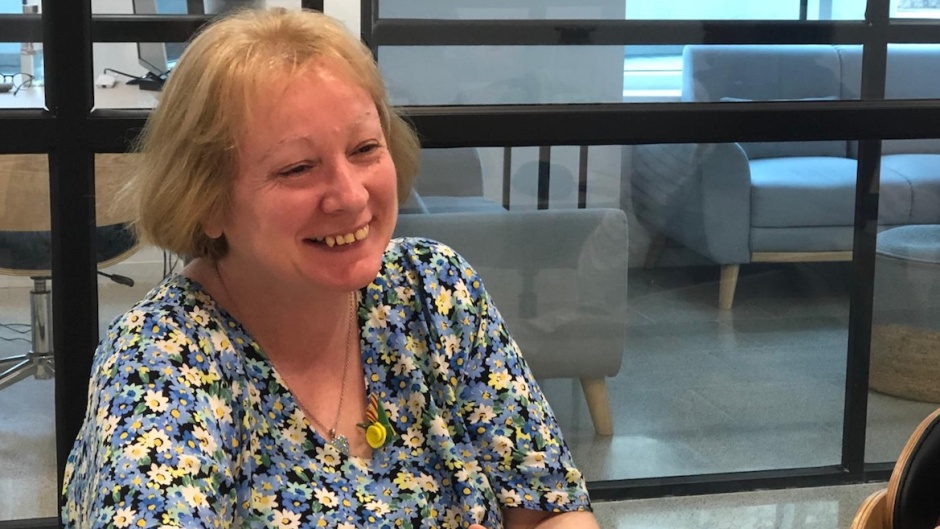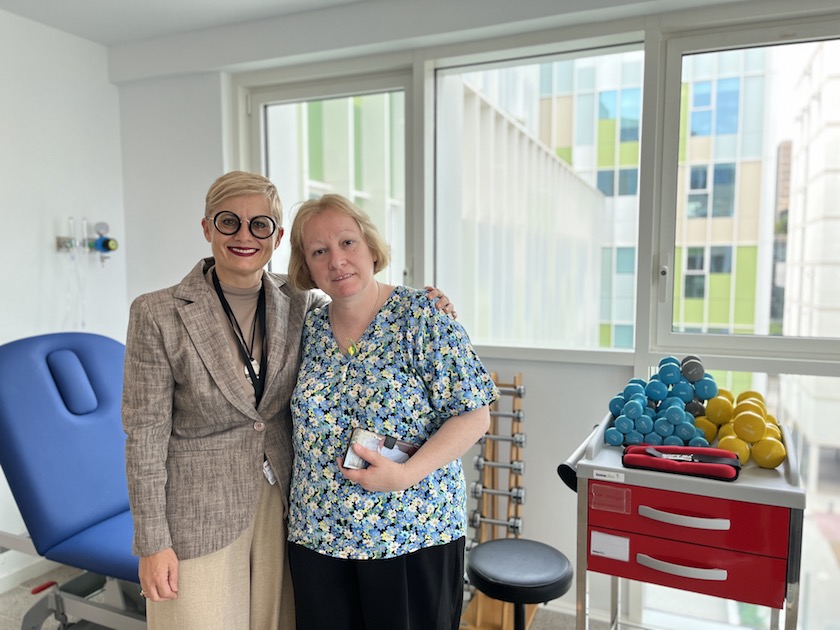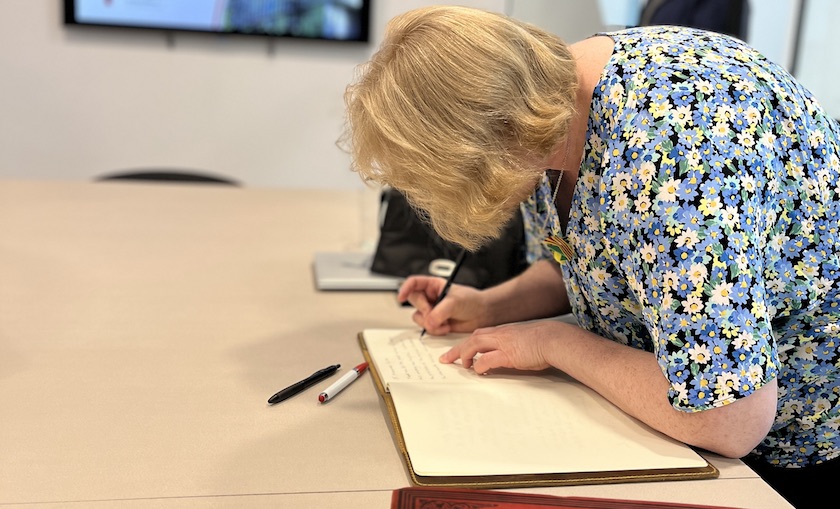George Lawrence’s great-granddaughter, Christina, visited the new building of the evangelical Hospital of Barcelona, an institution that her ancestor helped to found. We took the opportunity to chat with her.
 Christina Lawrence during her visit to the new building of the Hospital Evangèlic de Barcelona / Jonatán Soriano.
Christina Lawrence during her visit to the new building of the Hospital Evangèlic de Barcelona / Jonatán Soriano.
On 15 November, Barcelona’s Hospital Evangèlic received a special visitor to its new building. It was Christina, the great-granddaughter of the renowned English missionary George Lawrence, who served in Spain in the 19th century.
We accompanied her on a guided tour of the centre’s facilities and then spoke with her in a room that bears the family’s surname, in homage and remembrance of George, who was one of the founders of the hospital.
To get an idea of the historical curiosity that this visit represents, it is enough to observe the fourth generation in the line of descent of one of the founders of the hospital, walking through the corridors and rooms of the new facility. She pays attention to the details that the hospital manager, Reyes Gualda, explains to her. She looks with curiosity, and, inevitably, she thinks nostalgically.

[photo_footer]Christina Lawrence with Reyes Gualda, manager of the hospital, in the rehabilitation and gymnasium room / Photo: Irene Voz.[/photo_footer] Sitting in one of the chairs in the room that bears her surname, in recognition of her great-grandfather, Christina watches the projection of a promotional video of the Hospital Evangèlic. The video begins by alluding to the idea that if the founders of the centre could see what it has become today, they would be proud.
And pride is also what Christina feels for the memory of her great-grandfather, whose story she has been researching for two decades. “With the archive material I found, I completed my doctoral thesis”, she explains.
As we tour the hospital grounds and talk about the socio-political context of our time, Christina recalls the anecdote of how, on one occasion, supporters of the First Spanish Republic approached her great-grandfather to tell him that they didn’t need God because they were Republicans, and how George Lawrence replied that it was all very well for them to be Republicans, but that they still needed a Father.
The morning passed between memories of dates, names and situations. We finally sat down, with a coffee, and continued our conversation, with the indispensable company of Joaquim Campistron, who has studied the figure of the missionary so much and who shares a friendship with Christina.
[photo_footer] Christina with a copy of the ‘Holy Scriptures’ printed by her great-grandfather and a book in Catalan about the history of George, in the Lawrence Room. / Photo: Irene Voz [/photo_footer] Q. How does it feel to be here today, in the new building of the Evangelical Hospital of Barcelona, of which your great-grandfather was one of the founders?
Answer. I feel excited and very emotional. Just a coincidence, today is 15th of November, the birthday of my father. He died when I was 21 and from him I first learn a little bit about George Lawrence. It was because he told me about him that I wanted to find out more. But it took 20 years before I could find archive material. We were living in Germany. With the material I found two decades later in England, I completed my PhD.
I went to the Bible Society, the Echoes of Service in Bath, I went to the George Müller’s Museum in Bristol and to the London Trinitarian Bible Society. I went to Edinburgh’s Scottish Bible Society. So I found all the missionary letters of George Lawrence in these places. They showed me pictures, loads of photos, and that was the first time I saw any images of what George Lawrence looked like.
Q. George Lawrence was a charismatic person. How is being the great grand-daughter of a man who is so well-known in Spain?
A. I grew up in Germany and in England, but when I talked about his work to people and churches, people were not interested. This is a big contrast. And, my father didn’t have much information about George Lawrence, either.
Being young, it was important for me to find my personal faith, my relationship with God. My father did not say every day: ‘Remember you have a famous great-grandfather’. That would have been nonsense and irrelevant for my personal faith.
Despite knowing George had done some amazing things as a missionary, we had so little information. After 20 years of research, I would know why my father respected his grandfather so much. But for me, this did not grow out of a feeling that I have to be proud of my great grandfather. My relationship with Jesus Christ and my salvation is what is important here.

[photo_footer]Christina signs the guestbook of the Evangelical Hospital of Barcelona. / Photo: Irene Voz [/photo_footer] Q. Why do you think churches in England or Germany did not show interest in this story?
A. I don’t know. They say to me: “Oh, you had a famous great grandfather”. Well, our grandparents are also famous for something else.
Q. Spain has changed a lot since the time when your great-grandfather served here.
A. Yes. Even the language. George Lawrence published Bibles but also teaching books for schools. And some of the words that they used then, now have been replaced for others. For example, for glasses you’d say “anteojos”, now in Spain we say “gafas”.
Nevertheless, I think we can still understand the language of the Bible that George Lawrence published in Spanish.
[photo_footer]Christina Lawrence with Dr. Jesús Albuquerque during her visit to the hospital facilities. / Photo: Irene Voz. [/photo_footer] Q. And what about the society?
R: When he was here, it was the time of the Carlist wars. King Amadeo was on the throne those days and later, Alfonso XII. It was a difficult time, there was a lot of poverty.
People were a bit different. Do missionaries in our time look the same that in the 19th century? Then, people were high staters, and now if you are wearing a suite you look very formal and people don’t really trust you. But those days it made a good impression.
And those were the times of the printing press too. When George Lawrence was writing a letter to the Missionary Society he was saying: “I’m standing here. I can hear the loud noise from the printing press. Outside is the noise of the cannons and the shootings. These noises we should fight against”. He was printing the Bible, he was spreading the gospel in the middle of a civil war. He would not carry, he was a pacifist. Some other missionaries told George Lawrence he needed to get a gun, but he said he couldn’t hold a Bible in one hand and a pistol in the other. He was a missionary.
Even his children had a different approach to this. One of the daughters of George Lawrence worked in South Africa as a military nurse, and then even the nurses had to carry a gun. And later, when she lived in London, she still had her pistol.
Nowadays, I think most Christians are neither pacifists nor conscientious objectors. But for George Lawrence that was important.
Q. It seems we see missionaries today just as pastors or Bible teachers.
A. For George Lawrence that was not enough. You had to do be involved in many things. He had also a missionary friend in London, William Carter, who did the same. Carter and his wife were living in the poorest area of London. They managed a hostel for homeless men, women and families. It was the same kind of poverty that you could see in the school of the town of Caldes de Montbuí, near Barcelona.
William Carter said: “I can not preach the gospel to people who are hungry. They need food. I have to feed them and then I will be able to preach the Gospel".
Of course, missionaries are limited in what they can do. Missionary societies only gave the money for preaching the Gospel and printing Bibles. And money was limited. But George Lawrence managed to get donations from charity, from individuals, from churches, from Bible societies… And his mission work was comprehensive, holistic, including education, food, accommodation, and yes, printing Bibles as well. At his big home in Caldes he invited people who needed it, he had an open door policy.
[photo_footer] Christina with Reyes Gualda and Joaquim Campistron, the organiser of the George Lawrence Route in Caldes de Montbui, at the entrance of the hospital. / Irene Voz [/photo_footer] Q. Some of the institutions he founded now no longer exist.
A. Yes, George Lawrence died in 1894. Then, came other missionaries and who focused on preaching the gospel, on founding churches. But they didn’t think much about the other things, like schools or hospitals. Why they took these decisions I don’ know. I think it’s always possible to find money to give people who needed it a decent home, clothes and food.
Q. Finally, how do you think should mission be done today in our secularised context?
A. I think that is important to have the Evangelical Hospital working here in Barcelona. That is a practical witness: people can see the difference Christians make. As Christians, the Gospel instils in us a special sense of responsibility and care for people. Christians should care about the people around them.
[analysis]
[title]One more year[/title]
[photo][/photo]
[text]At Evangelical Focus, we have a sustainability challenge ahead. We invite you to join those across Europe and beyond who are committed with our mission. Together, we will ensure the continuity of Evangelical Focus and Protestante Digital (Spanish) in 2025.
Learn all about our #OneMoreYearEF campaign here (English).
[/text][/analysis]

Las opiniones vertidas por nuestros colaboradores se realizan a nivel personal, pudiendo coincidir o no con la postura de la dirección de Protestante Digital.
Si quieres comentar o